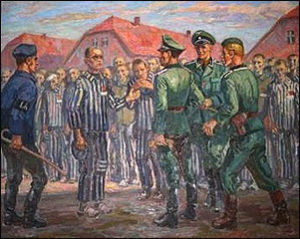1941
The German-Soviet conquest of Poland in the fall of 1939 was meant not just to occupy the country but to eradicate it. “All Poles,” said Hitler, “will disappear from the world.” Both the Nazi occupation forces and the Red Army immediately set about to destroy the Polish human infrastructure, murdering the officer class, the intellectuals and professionals or interning them in concentration camps. Clergy were a particular target: thousands of priests, monks, nuns, and seminarians were murdered. To the camp at Auschwitz in 1941 was sent Maximilian Maria Kolbe, a Franciscan friar.
Kolbe was born in 1894 when most of Poland was still part of the Russian empire. He joined the Franciscans at an early age and received an excellent education in Rome where he earned doctorates in both philosophy and theology. He became a priest in 1919 and returned to the newly-independent Polish Republic where he founded a monastery and operated a religious publishing house. In the 1930s he was sent on mission to Asia where he succeeded in opening a monastery in Nagasaki, Japan.
Kolbe was arrested briefly after the German invasion. He refused to be granted protected status which his German ancestry could have won him but instead operated a hospital and refuge in his monastery, sheltering many, including over a thousand Jews. He continued his printing operation whose anti-German publications resulted in his arrest by the Gestapo and his internment in Auschwitz.
At the end of July three prisoners from Kolbe’s block escaped and, as was the custom, ten other prisoners were selected to be executed in reprisal. One of those whose names were called out was Sergeant Franciszek Gajowniczek who cried out, “My wife! My children!” On hearing this, Kolbe stepped forward and told the SS captain: “I am a Catholic priest from Poland; I would like to take his place, because he has a wife and children.” He was granted his wish and with nine other condemned was sent to an underground cell where they were to be starved to death. According to the German guards, Kolbe’s behaviour was inspiring, leading his fellow prisoners in hymns and prayers and preserving their dignity until one by one they died, leaving only him alive. At this point the Germans decided they needed the cell and finished Kolbe off with a lethal injection.
Gajowniczek survived Auschwitz and another concentration camp, living out the war behind wire until the Red Army drove the Germans from Poland. He never ceased speaking of the man who had exchanged his own life for his. Soon miraculous healings were attributed to Kolbe’s heavenly intercession. In 1982 John Paul II, the first Polish pope, declared Kolbe a saint. He is considered to be the patron of drug addicts, political prisoners, families, journalists, and the pro-life movement.
